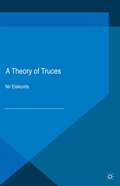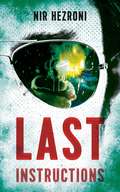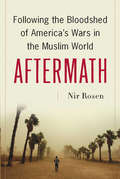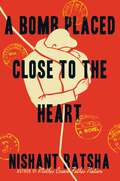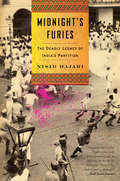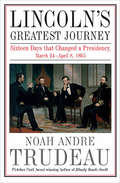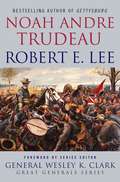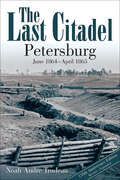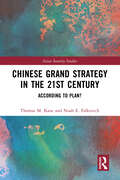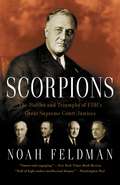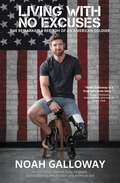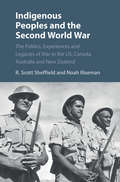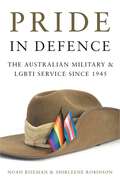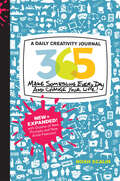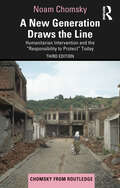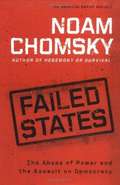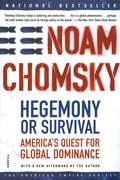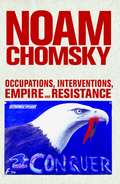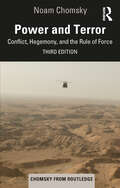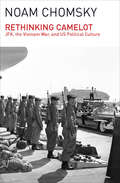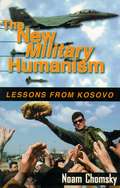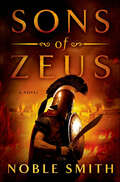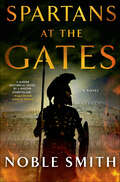- Table View
- List View
A Theory of Truces (Palgrave Studies in Ethics and Public Policy)
by Nir EisikovitsThis book argues that understanding truces is crucial for our ability to wind down wars. We have paid too much attention to the idea of permanent peace, yet few conflicts end in this way. The book describes how truce makers think, which truces can be morally justified and provides a philosophical history of truce making in the Western tradition.
Last Instructions (Agent 10483 Ser. #2)
by Nir HezroniFirst there was Three Envelopes, critically acclaimed on publication – now the story of Israeli secret service operative Agent 10483 continues in Last Instructions. A psychopathic former Israeli spy, Agent 10483 is busy trying to shut down the spy organization he once worked for. At the same time, he is plotting his revenge on the individuals he deemed responsible for betraying him, and trying to hunt down a nuclear warhead. It cannot end well. Everyone wants to get their hands on him: the Organization, two assassins working for Herr Schmidt, who is also trying to get hold of the warhead, and Carmit, who has quite literally been messing with his brain. Offering a fascinating behind-the-scenes glimpse into the technology of high-level intelligence operations, Nir Hezroni&’s dark thriller is a chilling exploration of a psychotic killer.
Aftermath: Following the Bloodshed of America's Wars in the Muslim World
by Nir RosenAs Iraq confronts a bleak and uncertain future and instability spreads throughout the region, an award winning journalist describes the new shape of the Middle East
A Bomb Placed Close to the Heart: A Novel
by Nishant BatshaNamed a Summer Read by: New York Times * Los Angeles Times * Minneapolis Star TribuneAn expansive and poignant novel of love, radical ambition, and intellectual rebirth set at the dawn of World War IAt a party near Stanford University’s campus in 1917, Cora Trent, a graduate student raised in the rugged mining towns of the American West, meets Indra Mukherjee, an Indian revolutionary newly arrived in California. Indra is grieving the recent loss of a friend and unsure of the place violence has in the cause of national liberation, while Cora is seeking a new life that stays true to her aspirations as a writer and an idealist. They spark an instant connection, and their passionate romance deepens as they attend protests alongside anticolonial dissidents and socialize with eccentric thinkers in Berkeley and Palo Alto. All the while, Indra awaits orders from a mysterious German spymaster.Cora and Indra quickly marry, even as the United States is drawn into the conflict in Europe and wartime patriotism begins to give way to increasing intolerance. When news of arrests threatens their future together, they are forced to flee to New York City with the hope that they can avoid the attention of the British and American authorities. Trying to find footing in their new life, Cora and Indra must reckon with divergent ambitions that challenge the foundations of their hasty marriage—and their freedom.Profound, immersive, tenderly written, and with finely wrought characters drawn from the forgotten archives of American history, A Bomb Placed Close to the Heart is an extraordinary story of a marriage caught at the intersection of radical politics and everyday life.
Midnight's Furies: The Deadly Legacy of India's Partition
by Nisid HajariA &“fast-moving and highly readable account&” of the Indo-Pakistani War of 1947 and its lasting legacy in today&’s geopolitical tensions (The New York Times). An NPR and Seattle Times Best Book of the Year Nobody expected the events of 1947 in Southeast Asia to be so bloody. The liberation of India and the birth of Pakistan were supposed to realize the dreams of Muslims and Hindus who had been ruled by the British for centuries. Jawaharlal Nehru, Gandhi&’s protégé and the political leader of India, believed Indians were an inherently nonviolent, peaceful people. Pakistan&’s founder, Mohammad Ali Jinnah, was a secular lawyer, not a firebrand. In August 1946, exactly a year before Independence, Calcutta erupted in street-gang fighting. A cycle of riots—targeting Hindus, then Muslims, then Sikhs—spiraled out of control. As the summer of 1947 approached, all three groups were arming themselves as the British rushed to evacuate. Some of the most brutal and widespread ethnic cleansing in modern history erupted on both sides of the new border, searing a divide between India and Pakistan that remains a root cause of many evils. From jihadi terrorism to nuclear proliferation, the searing tale told in Midnight&’s Furies explains all too many of the headlines we read today.
The Titan Game
by Niven BuschThe rules of the Titan Game are as deadly as gas and as devious as fog: torturers can become esteemed customers, bystanders are seldom innocent, a man's worst enemy is often himself...
Lincoln's Greatest Journey: Sixteen Days that Changed a Presidency, March 24–April 8, 1865
by Noah Andre TrudeauMarch 1865: The United States was at a crossroads and, truth be told, Abraham Lincoln was a sick man. I am very unwell, he confided to a close acquaintance. A vast and terrible civil war was winding down, leaving momentous questions for a war-weary president to address. A timely invitation from General U. S. Grant provided the impetus for an escape to City Point, Virginia, a journey from which Abraham Lincoln drew much more than he ever expected. Lincolns Greatest Journey: Sixteen Days that Changed a Presidency, March 24 April 8, 1865, by Noah Andre Trudeau offers the first comprehensive account of a momentous time.Lincoln traveled to City Point, Virginia, in late March 1865 to escape the constant interruptions in the nations capital that were carrying off a portion of his vitality, and to make his personal amends for having presided over the most destructive war in American history in order to save the nation. Lincoln returned to Washington sixteen days later with a renewed sense of purpose, urgency, and direction that would fundamentally shape his second term agenda.Previous coverage of this unprecedented triphis longest break from the White House since he had taken officehas been sketchy at best, and often based on seriously flawed sources. Lincolns Greatest Journey represents the most extensively researched and detailed story of these decisive sixteen days at City Point in a narrative laden with many heretofore unpublished accounts. The richly shaped prose, a hallmark of Trudeaus pen, rewrites much of the heretofore misunderstood story of what really happened to Lincoln during this time.A fresh, more complete picture of Lincoln emerges. This is Lincoln at a time of great personal and national changethe story of how he made peace with the past and became firmly future-focused, all set against a dramatically new narrative of what really happened during those last weeks of his life. It infuses the well-worn Lincoln narrative with fresh sources to fundamentally change an often-told story in ways large and small. Rather than treat Lincoln as a dead man walking when he returns to Washington, Trudeau paints him as he surely wasa changed man profoundly influenced by all that he experienced while at City Point.Lincolns Greatest Journey represents an important addition to the Lincoln saga. The conventional wisdom that theres nothing new to be learned about Lincoln is due for a major reset.
Robert E. Lee: Lessons in Leadership (Great Generals)
by Noah Andre TrudeauAn insightful new account, Robert E. Lee delivers a fresh perspective that leads to a greater understanding of one of the most studied and yet enigmatic military figures in American history. <P><P> General Robert E. Lee was a complicated man and military figure. From his birth as the son of a celebrated and tragic Revolutionary War hero, to his career after the Civil War when he led by example to heal the terrible wounds of the conflict, there is much to learn from this celebrated general. In just three years of service, he directed the Confederacy's most renowned fighting force, the famed Army of Northern Virginia, through a series of battles, including Second Manassas, Antietam, and Gettysburg, which have since come to define combat in the Civil War.
The Last Citadel: Petersburg, June 1864–April 1865
by Noah Andre TrudeauThe revised and updated groundbreaking study of the most extensive military operation of the Civil War—from the author of Bloody Roads South.The Petersburg campaign began on June 9, 1864, and ended on April 3, 1865, when Federal troops at last entered the city. It was the longest and most costly siege ever to take place on North American soil, yet it has been overshadowed by other actions that occurred at the same time period, most notably Sherman’s famous “March to the Sea,” and Sheridan’s celebrated Shenandoah Valley campaign. The ten-month Petersburg affair witnessed many more combat actions than the other two combined, and involved an average of 170,000 soldiers, not to mention thousands of civilians who were also caught up in the maelstrom. By its bloody end, the Petersburg campaign would add more than 70,000 casualties to the war’s total.With the same dogged determination that had seen him through the terrible Overland Campaign, Lieutenant General Ulysses S. Grant fixed his sights on the capture of Petersburg. Grant’s opponent, General Robert E. Lee, was equally determined that the “Cockade City” would not fall. Trudeau crafts this dramatic and moving story largely through the words of the men and women who were there, including officers, common soldiers, and the residents of Petersburg. What emerges is an epic account rich in human incident and adventure. Based on exhaustive research into official records and unpublished memoirs, letters, and diaries, as well as published recollections and regimental histories, The Last Citadel also includes twenty-three maps and a choice selection of drawings by on-the-spot combat artists.
Chinese Grand Strategy in the 21st Century: According to Plan? (Asian Security Studies)
by Thomas M. Kane Noah FalkovichThis book examines the state of China’s grand strategy in the 21st century, including political, military and economic factors. Over the past two decades, the People’s Republic of China (PRC) has attained the second highest gross domestic product in the world, taken a leadership role in East Asian regional organisations and substantially improved its military capabilities. Each of these developments – and many others like them – have attracted attention from scholars, journalists and policymakers. Less frequently acknowledged – but perhaps of greater significance – is the impressive congruence of Beijing’s accomplishments. This book highlights how the PRC’s successes support one another and pave the way for future accomplishments, and how these successes seem to be achieved in an unusually coherent and purposeful way. As Beijing’s relations with the rest of the world continue to evolve, with events ranging from the ongoing global economic crisis to the turbulence in China’s own stock market which may bring the PRC’s government under pressure to re-order its priorities, this book assesses China’s grand strategy and long-term approach to national policy. It identifies the political, military and economic instruments it is likely to use, the key challenges which it will face, and explores the implications for the global community. This book will be of great interest to students of Chinese politics, foreign policy, strategic studies, international security and IR in general.
Scorpions: The Battles and Triumphs of FDR's Great Supreme Court Justices
by Noah FeldmanA tiny, ebullient Jew who started as America's leading liberal and ended as its most famous judicial conservative. A Klansman who became an absolutist advocate of free speech and civil rights. A backcountry lawyer who started off trying cases about cows and went on to conduct the most important international trial ever. A self-invented, tall-tale Westerner who narrowly missed the presidency but expanded individual freedom beyond what anyone before had dreamed. Four more different men could hardly be imagined. Yet they had certain things in common. Each was a self-made man who came from humble beginnings on the edge of poverty. Each had driving ambition and a will to succeed. Each was, in his own way, a genius. They began as close allies and friends of FDR, but the quest to shape a new Constitution led them to competition and sometimes outright warfare. SCORPIONS tells the story of these four great justices: their relationship with Roosevelt, with each other, and with the turbulent world of the Great Depression, World War II, and the Cold War. It also serves as a history of the modern Constitution itself.
Living with No Excuses: The Remarkable Rebirth of an American Soldier
by Noah GallowayMilitary hero and beloved Dancing with the Stars alum Noah Galloway shares his life story, and how losing his arm and leg in combat forced him to relearn how to live--and live to the fullest.Inspirational, humorous, and thought provoking, Noah Galloway's LIVING WITH NO EXCUSES sheds light on his upbringing in rural Alabama, his military experience, and the battle he faced to overcome losing two limbs during Operation Iraqi Freedom. From reliving the early days of life to his acceptance of his "new normal" after losing his arm and leg in combat, Noah reveals his ambition to succeed against all odds. Noah's gripping story is a shining example that with laughter, and the right amount of perspective, you can tackle anything. Whether it be overcoming injury, conquering the Dancing with the Stars ballroom, or taking the next steps forward in life with his young family - Noah demonstrates how to live life to the fullest, with no excuses.
Indigenous Peoples and the Second World War: The Politics, Experiences and Legacies of War in the US, Canada, Australia and New Zealand
by R. Scott Sheffield Noah RisemanDuring the Second World War, Indigenous people in the United States, Australia, New Zealand and Canada mobilised en masse to support the war effort, despite withstanding centuries of colonialism. Their roles ranged from ordinary soldiers fighting on distant shores, to soldiers capturing Japanese prisoners on their own territory, to women working in munitions plants on the home front. R. Scott Sheffield and Noah Riseman examine Indigenous experiences of the Second World War across these four settler societies. Informed by theories of settler colonialism, martial race theory and military sociology, they show how Indigenous people and their communities both shaped and were shaped by the Second World War. Particular attention is paid to the policies in place before, during and after the war, highlighting the ways that Indigenous people negotiated their own roles within the war effort at home and abroad.
Pride in Defence: The Australian Military and LGBTI Service since 1945
by Noah Riseman Shirleene RobinsonSince the Second World War the Australian military has undergone remarkable transformations in the way it has treated lesbian, gay, bisexual, transgender and intersex service members: it has shifted from persecuting, hunting and discharging LGBTI members to embracing them as valued members who enhance the Force's capabilities. LGBTI people have served in the Australian military since its very beginnings, yet Australian Defence Force histories have been very slow to recognise this. Pride in Defence confronts that silence. It charts the changing policies and practices of the ADF, illuminating the experiences of LGBTI members in what was often a hostile institution. Drawing on over 140 interviews and previously unexamined documents, Pride in Defence features accounts of secret romances, police surveillance and traumatic discharges. At its centre are the courageous LGBTI members who served their country in the face of systemic prejudice. In doing so, they showed the power of diversity and challenged the ADF to make it a far stronger institution.
A Daily Creativity Journal
by Noah ScalinThis inspiring journal featuring hundreds of project prompts will help you unlock your creativity with a year of daily artmaking!The concept of Noah Scalin’s “365 method” is simple but inspired: Choose a theme or medium, then make something with it every day for a year. Noah made 365 skull-themed projects . . . now he invites you to choose your obsession and get creative!A Daily Creative Journal offers 365 project prompts to kick start your creativity. It offers tips on how to choose your subject and document your work, plus examples from other artists and crafters who took the 365 challenge. It also introduces new techniques to incorporate into your projects, including quilling, clay-making, paper pop-up engineering, and more. With 365: A Daily Creativity Journal you’ll see how making something every day can change your creative process—and your life—forever!
The Crime of Aggression: The Quest for Justice in an Age of Drones, Cyberattacks, Insurgents, and Autocrats (Human Rights and Crimes against Humanity #36)
by Noah WeisbordA gripping behind-the-scenes account of the dramatic legal fight to hold leaders personally responsible for aggressive warOn July 17, 2018, starting an unjust war became a prosecutable international crime alongside genocide, crimes against humanity, and war crimes. Instead of collective state responsibility, our leaders are now personally subject to indictment for crimes of aggression, from invasions and preemptions to drone strikes and cyberattacks. The Crime of Aggression is Noah Weisbord’s riveting insider’s account of the high-stakes legal fight to enact this historic legislation and hold politicians accountable for the wars they start.Weisbord, a key drafter of the law for the International Criminal Court, takes readers behind the scenes of one of the most consequential legal dramas in modern international diplomacy. Drawing on in-depth interviews and his own invaluable insights, he sheds critical light on the motivations of the prosecutors, diplomats, and military strategists who championed the fledgling prohibition on unjust war—and those who tried to sink it. He untangles the complex history behind the measure, tracing how the crime of aggression was born at the Nuremberg trials only to fall dormant during the Cold War, and he draws lessons from such pivotal events as the collapse of the League of Nations, the rise of the United Nations, September 11, and the war on terror.The power to try leaders for unjust war holds untold promise for the international order, but also great risk. In this incisive and vitally important book, Weisbord explains how judges in such cases can balance the imperatives of justice and peace, and how the fair prosecution of aggression can humanize modern statecraft.
A New Generation Draws the Line: Humanitarian Intervention and the “Responsibility to Protect” Today (Chomsky from Routledge)
by Noam ChomskyIn this work, Chomsky explores the West’s uses and abuses of the principle of "human intervention." An updated foreword by Jean Bricmont explores the ongoing crises of humanitarian intervention in Afghanistan, Libya, Palestine, Syria, and Ukraine and reaffirms Chomsky’s excoriating critiques of Western foreign policy.Chomsky dissects the meaning and uses of humanitarian intervention grounded in the so-called "right to protect" (R2P). In doing so, Chomsky demonstrates how the principle of human intervention has been used as an instrument to justify military intervention in support of Western foreign policy aims. Through detailed case studies of the humanitarian intervention in East Timor and Kosovo, Chomsky also highlights how "humanitarian intervention" often leads to further atrocities and egregious abuses of human rights.As the question of humanitarian intervention looms ever larger, particularly with regard to the Middle East and Eastern Europe, this book is a vital overview of humanitarian intervention and its uses and abuses.
Failed States: The Abuse of Power and the Assault on Democracy
by Noam ChomskyTHE WORLD'S FOREMOST CRITIC OF U.S. FOREIGN POLICY EXPOSES THE HOLLOW PROMISES OF DEMOCRACY IN U-S. ACTIONS ABRoAD -AND AT HOME THE UNITED STATES HAS REPEATEDLY asserted its right to intervene militarily against "failed states" around the globe. In this muchanticipated follow-up to his international bestseller Hegemony or Survival, Noam Chomsky turns the tables, showing how the United States itself shares features with other failed states and therefore is increasingly a danger to its own people and the world. Failed states, Chomsky writes, are those that are unable or unwilling "to protect their citizens from violence and perhaps even destruction" and "regard themselves as beyond the reach of domestic or international law." Though they may have democratic forms, Chomsky notes, failed states suffer from a serious "democratic deficit" that deprives their democratic institutions of real substance. Exploring the latest developments in U.S. foreign and domestic policy, Chomsky reveals Washington's plans to further militarize the planet greatly increasing the risks of nuclear war; assesses the dangerous consequences of the occupation of Iraq, which has fueled global outrage at the United States; documents Washington's self-exemption from international norms, including the UN Charter and the Geneva Conventions, the foundations of contemporary international law, and the Kyoto Protocol; and examines how the U.S. electoral system is designed to eliminate genuine political alternatives, impeding any meaningful democracy.
Hegemony or Survival: America's Quest for Global Dominance
by Noam ChomskyAn immediate national bestseller, Hegemony or Survival demonstrates how, for more than half a century the United States has been pursuing a grand imperial strategy with the aim of staking out the globe. Our leaders have shown themselves willing-as in the Cuban missile crisis-to follow the dream of dominance no matter how high the risks. World-renowned intellectual Noam Chomsky investigates how we came to this perilous moment and why our rulers are willing to jeopardize the future of our species. With the striking logic that is his trademark, Chomsky tracks the U.S. government's aggressive pursuit of "full spectrum dominance" and vividly lays out how the most recent manifestations of the politics of global control-from unilateralism to the dismantling of international agreements to state terrorism-cohere in a drive for hegemony that ultimately threatens our existence. Lucidly written, thoroughly documented, and featuring a new afterword by the author, Hegemony or Survival is a definitive statement from one of today's most influential thinkers.
Making the Future: Occupations, Interventions, Empire and Resistance
by Noam ChomskyMaking the Future presents more than fifty concise and persuasively argued commentaries on U.S. politics and policies, written between 2007 and 2011. Taken together, Chomsky's essays present a powerful counter-narrative to official accounts of the major political events of the past four years: the wars in Afghanistan and Iraq; the U.S. presidential race; the ascendancy of China; Latin America's leftward turn; the threat of nuclear proliferation in Iran and North Korea; Israel's invasion of Gaza and expansion of settlements in Jerusalem and the West Bank; developments in climate change; the world financial crisis; the Arab Spring; the assassination of Osama bin Laden; and the Occupy protests. Laced throughout his critiques are expressions of commitment to democracy and the power of popular struggles. "Progressive legislation and social welfare," writes Chomsky, "have been won by popular struggles, not gifts from above. Those struggles follow a cycle of success and setback. They must be waged every day, not just once every four years, always with the goal of creating a genuinely responsive democratic society, from the voting booth to the workplace." Making the Future is a follow-up to Interventions, published by City Lights in 2007 and banned from Guantánamo Bay by U.S. military censors. Both books are drawn from articles Chomsky has been writing regularly for the New York Times Syndicate, but which go largely ignored by newspapers in the United States. Making the Future offers fierce, accessible, timely, gloves-off political writing by one of America's foremost intellectual and political dissidents.
Power and Terror: Conflict, Hegemony, and the Rule of Force (Chomsky from Routledge)
by Noam ChomskyIn this pertinent book, Noam Chomsky examines the imbalanced dynamics of international power relations and the use of state terror by the United States and other Western powers in the Middle East in the post-9/11 era. This edition features new forewords by Fred Branfman and Chris Hedges reasserting the enduring importance of Chomsky’s work and extending Chomsky’s analysis to recent developments in the Middle East.Chomsky explores international relations since World War II to demonstrate that contemporary acts of terrorism cannot be understood outside the context of Western power and state terror throughout the world, particularly in the Middle East. In doing so, Chomsky demonstrates that state terror is intrinsic to U.S. foreign policy and fundamental in the maintenance of Western hegemony throughout the so-called War on Terror, including throughout the Obama administration.This new edition offers a vital critique of U.S. foreign policy and its reliance on acts of terror to maintain its hegemony in the Middle East. It will therefore be vital reading for those who wish to understand the grim realities of Western foreign policy.
Rethinking Camelot: JFK, the Vietnam War, and U.S. Political Culture
by Noam ChomskyThe famed political critic &“analyzes the issue most prominently posed in Oliver Stone&’s film JFK . . . strong arguments against Kennedy mythologists&” (Publishers Weekly). Rethinking Camelot is a thorough analysis of John F. Kennedy&’s role in the US invasion of Vietnam and a probing reflection on the elite political culture that allowed and encouraged the Cold War. In it, Chomsky dismisses efforts to resurrect Camelot—an attractive American myth portraying JFK as a shining knight promising peace, foiled only by assassins bent on stopping this lone hero who would have unilaterally withdrawn from Vietnam had he lived. Chomsky argues that US institutions and political culture, not individual presidents, are the key to understanding US behavior during Vietnam. Rethinking Camelot is &“an interesting work not only for the history it explores, but also as a study of how various individuals and groups write and interpret history&” (Choice). Praise for Noam Chomsky &“Chomsky is a global phenomenon . . . perhaps the most widely read voice on foreign policy on the planet.&” —The New York Times Book Review &“The conscience of the American people.&” —New Statesman &“Reading Chomsky is like standing in a wind tunnel. With relentless logic, Chomsky bids us to listen closely to what our leaders tell us—and to discern what they are leaving out . . . The questions Chomsky raises will eventually have to be answered. Agree with him or not, we lose out by not listening.&” —Business Week &“One of the radical heroes of our age . . . a towering intellect . . . powerful, always provocative.&” —The Guardian
The New Military Humanism: Lessons From Kosovo
by Noam ChomskyAnalyzing the NATO bombing, Chomsky challenges the New Humanism: Is it guided by power interests, or by humanitarian concern? Is the resort to force undertaken in the name of principles and values? Or are we witnessing something more crass and familiar?
Sons of Zeus: A Novel (Nikias of Plataea #1)
by Noble SmithIn 431 B.C., Ancient Greece experienced its own "Pearl Harbor"—a treacherous sneak attack that would mark the start of the bloody war between the democracy of Athens and the tyranny of Sparta. Caught between these superpowers, the independent city-state of Plataea became the arena where their battle for control of all of Greece would begin.In Plataea, the young Greek warrior Nikias dreams of glory in the Olympic games as he trains for the pankration—the no-holds-barred ultimate fighting of the era—until an act of violence in defense of his beloved threatens to send him into exile. But before his trial can take place, a traitor opens the city gates to a surprise attack force.Suddenly trapped inside their own fortress, the Plataeans are fighting for their lives. As Nikias seeks to discover the identity of the man who betrayed the city, he makes a daring escape, gathers an army, and leads this ragtag band into a suicidal battle at the gates of the citadel—a battle that will decide the fates of his family, his friends, and the woman he loves.In the vein of Bernard Cornwell, Conn Iggulden, and Steven Pressfield, Sons of Zeus marks the beginning of a richly detailed new action-adventure series.
Spartans at the Gates: A Novel (Nikias of Plataea #2)
by Noble SmithThe Peloponnesian War has begun. An army of merciless Spartan invaders have arrived at the gates of Plataea, bent on obliterating the independent city-state and its inhabitants. Plataea's oldest allies, the Athenians, are spread too thin in their own campaigns to send help. Cut off and alone, the Plataeans have dug in behind their high walls for the coming attack, while the tyrannical Spartans prepare to lay siege.On a rugged mountain road, a young Plataean warrior named Nikias rides to Athens on an urgent quest. He carries with him a bag of ill-gotten gold, hoping to raise an army of mercenaries to help defend his citadel from the Spartan assault. But in the sprawling stronghold of Athens, Nikias encounters perils that prove to be more dangerous than those he has faced on the battlefield. Noble Smith's Spartans at the Gates transports us to the dawn of one of history's most famous wars--a fight that would tear apart the great powers of ancient Greece.
